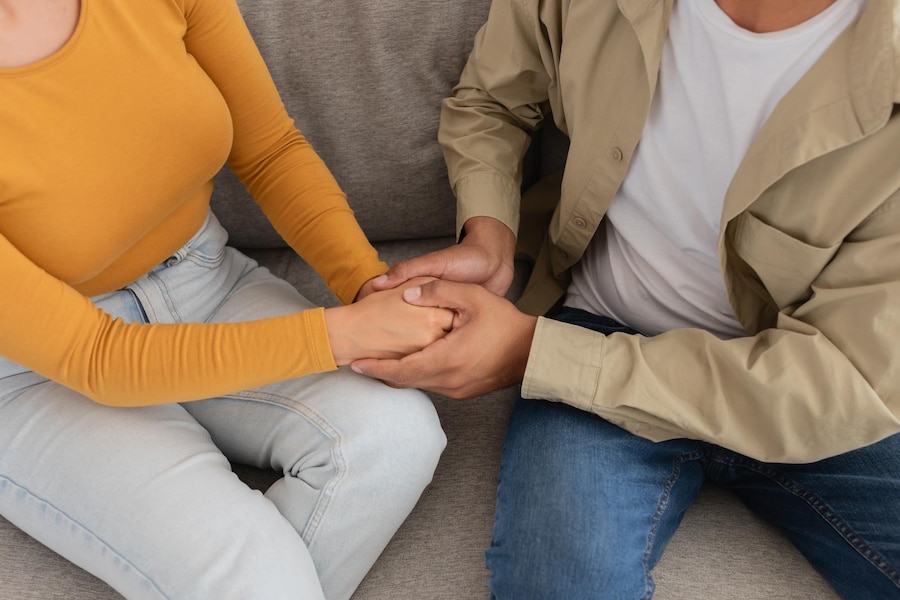Couples Detox and Recovery Centers offer specialized treatment programs designed to address the unique challenges faced by partners who are struggling with substance abuse. These centers focus on providing integrated care that supports both individuals in a relationship while they work towards recovery. At Couples Rehab in Orange County, we understand that addiction affects not only the individual but also the dynamics of the relationship, and our programs are tailored to address these intertwined issues.
Our approach is holistic, ensuring that both partners receive the necessary support and therapy to overcome their addiction while strengthening their relationship. By choosing a detox and recovery center for couples, partners can benefit from a coordinated treatment plan that supports joint healing and fosters a stronger, healthier relationship.
Couples Rehab Services
What Are Couples Detox and Recovery Centers?
Couples Detox and Recovery Centers are specialized facilities designed to address substance abuse issues affecting both partners in a relationship. These centers provide tailored treatment programs that cater to the unique needs of each individual while also focusing on the dynamics and challenges within their relationship. The overarching goal is to create a supportive environment where both partners can work on their recovery together, fostering mutual growth and healing.
Integrated Treatment Approach
At Couples Detox and Recovery Centers, the treatment approach is comprehensive and multifaceted. The centers offer a range of services that include detoxification, individual therapy, couples therapy, and counseling. Detoxification is the first critical step, focusing on safely removing substances from the body while managing withdrawal symptoms. This phase is essential for both partners to start their recovery on a solid foundation.
Following detox, the treatment centers provide various therapeutic modalities to address the psychological and emotional aspects of addiction. Individual therapy sessions are designed to help each partner explore their personal struggles with substance abuse, identify underlying issues, and develop coping strategies. These sessions are complemented by couples therapy, which addresses the dynamics of the relationship, improves communication, and helps partners support each other in their recovery process.
Focus on Relationship Dynamics
One of the key benefits of Couples Detox and Recovery Centers is their focus on the relationship dynamics that contribute to substance abuse. Substance abuse often affects not only the individual but also their relationship, creating patterns of behavior that can hinder recovery. By treating both partners simultaneously, these centers aim to address the relational issues that may have contributed to or been exacerbated by addiction.
Couples therapy within these centers is designed to strengthen the relationship, build trust, and improve communication skills. This holistic approach helps partners understand each other’s experiences, develop shared goals for recovery, and work together towards a healthier future. The supportive environment provided by the center fosters mutual encouragement and accountability, which can be instrumental in achieving lasting sobriety.
Customized Treatment Programs for Couples
Customized treatment programs for couples are tailored to meet the unique needs and challenges of each partner within the relationship. These programs take into account individual substance use histories, relationship dynamics, and personal goals to create a comprehensive treatment plan.
At Couples Rehab, we develop personalized treatment plans that address both partners’ needs, incorporating a range of therapies and interventions. By focusing on individual and relational aspects of recovery, our programs aim to facilitate healing and support long-term sobriety for both partners.
Detoxification Process for Couples
The detoxification process for couples is a crucial initial step in the recovery journey, focusing on managing withdrawal symptoms and ensuring a supportive environment as both partners begin their path to sobriety. This phase is essential for preparing individuals for subsequent therapeutic interventions by safely removing harmful substances from their bodies and addressing any relational challenges that may arise.
Medically Supervised Detoxification
At Couples Rehab, we offer a medically supervised detoxification process specifically tailored for couples. This supervision ensures that both partners receive appropriate medical care throughout the detox phase, addressing any withdrawal symptoms they may experience. The detox process is closely monitored by healthcare professionals who are experienced in managing both the physical and psychological aspects of withdrawal. This careful management helps to minimize discomfort and prevent potential complications, making the detox experience as safe and comfortable as possible.
Supporting Each Other Through Detox
One of the unique aspects of detoxification for couples is the opportunity for both partners to support each other through this challenging period. Detox can be physically and emotionally demanding, and having a partner who understands and shares the experience can be immensely beneficial. At Couples Rehab, we recognize the importance of this mutual support and provide a structured environment that encourages couples to lean on each other while also addressing any relationship dynamics that may come into play.
During the detox phase, couples are encouraged to communicate openly and support one another as they navigate the withdrawal process. Our program includes couples therapy sessions that help partners address any relational issues that may arise during detox, such as stress, anxiety, or conflicts. By providing a space for couples to discuss their feelings and challenges, we aim to strengthen their relationship and build a foundation for successful recovery.
Therapeutic Interventions
Therapeutic interventions are integral to the addiction treatment process, particularly in programs designed for couples. These interventions encompass a variety of therapeutic approaches, including individual therapy, couples counseling, and group therapy. Each component plays a unique role in addressing both the personal and relational aspects of addiction, supporting couples as they work towards recovery.
Individual Therapy
Individual therapy is a fundamental aspect of addiction treatment, providing each partner with the opportunity to address their personal issues related to substance abuse. This therapy focuses on exploring the underlying factors contributing to addiction, such as trauma, mental health disorders, and behavioral patterns. Evidence-based approaches, such as Cognitive Behavioral Therapy (CBT), are often employed to help individuals identify and modify harmful thought patterns and behaviors associated with addiction. By addressing these personal issues, individual therapy helps partners develop healthier coping strategies and gain insights into their addiction, setting the stage for a more effective recovery process.
Couples Counseling
Couples counseling is a key intervention in programs that focus on both partners. This type of therapy addresses the relational dynamics that can impact addiction and recovery. Emotionally Focused Therapy (EFT) is one example of a therapeutic approach used to help couples improve communication, resolve conflicts, and strengthen their emotional connection. By working on these aspects, couples counseling aims to enhance mutual understanding and support, which is crucial for successful recovery. The goal is to build a stronger relationship foundation that supports both partners in their individual and shared recovery efforts.
Group Therapy
Group therapy provides a valuable opportunity for individuals to connect with others who are facing similar challenges. In the context of a couples-focused program, group therapy allows both partners to share their experiences and gain support from others in the same situation. This setting fosters a sense of community and reduces feelings of isolation, which can be particularly beneficial during the recovery process. Group therapy sessions often focus on topics such as coping strategies, relapse prevention, and personal growth, helping couples develop skills and gain insights that support their recovery journey.
Holistic Integration
In addition to traditional therapeutic interventions, our program at Couples Rehab also incorporates holistic therapies that complement the primary treatment approaches. These may include mindfulness practices, art therapy, and wellness activities designed to promote overall well-being and support the recovery process. By integrating these holistic approaches, we aim to address the whole person and enhance the effectiveness of our therapeutic interventions.

Strengthening Relationship Dynamics
Strengthening relationship dynamics is a central focus of couples detox and recovery programs, as addiction frequently places significant strain on relationships. The challenges brought about by substance abuse can deeply affect how partners interact, communicate, and support each other. Addressing these issues is not only essential for effective recovery but also crucial for ensuring the stability and health of the relationship in the long term.
Addressing Strain and Conflict
Addiction can lead to numerous relational problems, including increased tension, frequent arguments, and emotional detachment. The stress of managing addiction and its consequences often exacerbates these issues, making it challenging for couples to maintain a healthy and supportive relationship. By focusing on strengthening relationship dynamics, couples detox and recovery programs aim to address these strains head-on, helping partners navigate the complex emotions and conflicts that arise during recovery.
Therapy and Counseling for Improved Communication
At Couples Rehab, we recognize the importance of effective communication in overcoming addiction and rebuilding a relationship. Our therapy and counseling services are designed to enhance how partners interact with one another, providing them with the tools to communicate more openly and constructively. This involves teaching couples techniques for active listening, expressing their needs and feelings clearly, and understanding each other’s perspectives. Improved communication fosters a more supportive environment, essential for both individual recovery and relational healing.
Educational and Support Services
Educational and support services play a vital role in the recovery process, providing couples with the knowledge and resources they need to maintain their sobriety and strengthen their relationship. These services may include educational workshops, support groups, and informational resources.
Couples Rehab offers a variety of educational and support services to complement our treatment programs. These services are designed to enhance couples’ understanding of addiction, recovery, and relationship dynamics, providing them with the tools and resources needed for long-term success.
Aftercare and Continued Support
Aftercare and continued support play a vital role in maintaining sobriety and reinforcing the skills learned during treatment. For couples undergoing recovery, this support extends beyond the initial treatment phase and includes ongoing counseling, relapse prevention strategies, and resources to help partners stay connected and focused on their recovery goals.
Importance of Aftercare in Recovery
Aftercare is essential for ensuring that the progress made during treatment is sustained over the long term. Recovery does not end when formal treatment concludes; rather, it is an ongoing process that requires continuous effort and support. Aftercare provides individuals with the tools and resources needed to navigate the challenges of daily life while maintaining their commitment to sobriety.
Tailored Aftercare for Couples
At Couples Rehab, we recognize that the recovery journey for couples involves unique challenges and dynamics. Our aftercare programs are specifically designed to address these needs and support both partners as they transition back into their daily lives. This includes offering ongoing counseling and therapy sessions that focus on maintaining the gains achieved during treatment and addressing any new issues that may arise.
Relapse Prevention Strategies
Relapse prevention is a key component of our aftercare services. We work with couples to develop personalized relapse prevention plans that include identifying potential triggers, establishing coping mechanisms, and setting up a support network. These strategies help couples stay vigilant and proactive in managing their recovery, reducing the risk of relapse and reinforcing their commitment to sobriety.
Find Couples Detox and Recovery at Couples Rehab
Couples Detox and Recovery Centers offer a unique and valuable approach to addiction treatment, addressing both individual and relationship needs in a supportive and integrated environment. At Couples Rehab, we are committed to providing comprehensive care that supports both partners in their recovery journey. Our customized treatment programs, therapeutic interventions, and robust aftercare services are designed to help couples achieve lasting sobriety and build a stronger, healthier relationship. By focusing on both personal and relational aspects of recovery, we aim to foster a successful and enduring path to recovery for every couple we serve. If you’re interested in learning more about our couples detox and recovery programs, we encourage you to contact us today. At Couples Rehab, we are dedicated to supporting your journey to lasting recovery and a healthier relationship. Our team is here to provide the guidance, support, and resources you need to succeed in your recovery journey.
FAQ’s
1. Q: How to choose a couples detox and recovery center? A: Selecting the right program involves considering factors like specialized programs, detoxification services, therapy options, aftercare planning, location, and amenities.
2. Q: What to expect in a couples detox program? A: Couples detox programs focus on medical supervision, emotional support, education, and relationship assessment.
3. Q: How can couples therapy help in addiction recovery? A: Couples therapy addresses communication breakdown, codependency, trust rebuilding, and relationship strengthening.
4. Q: How to support a partner through detox? A: Offer support by educating yourself about addiction, being patient and understanding, encouraging open communication, and seeking support for yourself.
5. Q: How can couples rebuild trust after addiction? A: Rebuilding trust requires honesty, transparency, consistent actions, individual therapy, and couples therapy.
6. Q: How to prevent relapse in a couple’s recovery journey? A: Relapse prevention involves a strong support system, healthy coping mechanisms, open communication, and continued therapy.
7. Q: What are the benefits of a couples rehab program? A: Couples rehab programs offer shared support, improved communication, enhanced coping skills, and increased chances of long-term sobriety.
8. Q: What to pack for a couples rehab program? A: Essential items include comfortable clothing, toiletries, medications, books, and a list of emergency contacts.
9. Q: How to create a supportive home environment after rehab? A: Foster a healthy home atmosphere by setting boundaries, encouraging healthy activities, practicing open communication, and seeking support.
10. Q: How can couples find a support group together? A: Consider attending couples therapy groups, joining individual support groups like AA or NA, or exploring online support communities.












